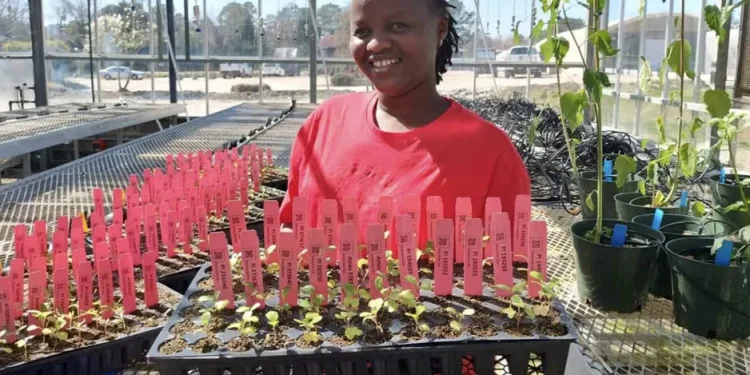As the world grapples with food security and sustainable agriculture challenges, innovative research in the agricultural sector is becoming increasingly critical. One such initiative, spearheaded by NC State University, is focusing on African Indigenous Vegetables (AIVs) to address nutritional deficiencies and improve food security in vulnerable communities. This research is particularly promising for entrepreneurs and investors looking for opportunities in the agricultural sector, especially in regions where traditional farming practices have yet to meet the demands of a growing population.
The Genesis of a Promising Initiative
Gladys Wanja Njeri, a graduate student in the Department of Horticultural Science at NC State University, grew up in Kenya, where agriculture was not just a way of life but a critical economic activity. Surrounded by the agricultural practices of her family, Njeri developed a keen interest in horticulture, motivated by the challenges faced by her community during drought seasons.
Now, in collaboration with NC State’s Plant Breeding Consortium, the Kenya Agricultural & Livestock Research Organization (KALRO), the University of Nairobi, and funded by the USAID through the Horticulture Innovation Lab, Njeri is working on breeding African Indigenous Vegetables for nutritional value and climate adaptation. This project aims to enhance food security and provide sustainable income opportunities for farmers in Kenya and potentially across East Africa.
Focus on African Indigenous Vegetables
The research focuses on a variety of AIVs, including African nightshade (Solanum spp.), amaranth (Amaranthus spp.), spider plant (Cleome gynandra), slender leaf (Crotalaria spp.), jute mallow (Corchorus olitorius), cowpeas (Vigna unguiculata), and Ethiopian kale (Brassica carinata). Traditionally harvested from the wild, these vegetables have now been domesticated by farmers and are recognized for their high nutritional content, including vital micronutrients such as iron, calcium, and zinc.
A key goal of the project is to characterize the genetic diversity and nutritional composition of these vegetables, with the aim of developing varieties that are better adapted to local conditions and have enhanced nutritional value. This research is crucial in combating malnutrition, which affects approximately 20% of Kenyans, particularly children, who suffer from micronutrient deficiencies.
Economic and Social Impact
The economic potential of AIVs is significant. As these vegetables gain popularity in urban markets, they offer a viable income source for smallholder farmers, particularly women and youths, who are increasingly involved in their cultivation and marketing. By promoting the production and consumption of AIVs, the project aims to address unemployment in rural areas while improving the dietary diversity and health of communities.
In addition to its nutritional benefits, the cultivation of AIVs presents an opportunity for sustainable farming practices. These vegetables are well-suited to local growing conditions, require minimal inputs, and can be harvested quickly, making them an ideal crop for resource-constrained farmers. Moreover, the introduction of these vegetables into school feeding programs and local markets could help bridge the nutritional gap in many African households.
Looking Ahead
The research conducted by Njeri and her team is not just about improving crop yields; it is about creating a sustainable future for communities that rely on agriculture for their livelihoods. By generating genetic and nutritional data on AIVs, the project aims to promote the selection, cultivation, and distribution of high-quality, nutritious varieties that can thrive in diverse environmental conditions.
The findings from this research will be instrumental in training farmers through extension services, providing them with the knowledge and tools needed to grow and market these valuable crops. The project’s long-term vision includes the development of seed production and distribution networks across East Africa, ensuring that farmers have access to high-quality seeds that are essential for successful cultivation.
For investors and entrepreneurs, this initiative represents a unique opportunity to support and benefit from sustainable agricultural practices that have the potential to transform the economic landscape of rural Africa. By investing in the cultivation and promotion of African Indigenous Vegetables, stakeholders can contribute to a more food-secure and nutritionally balanced future for millions of people.










